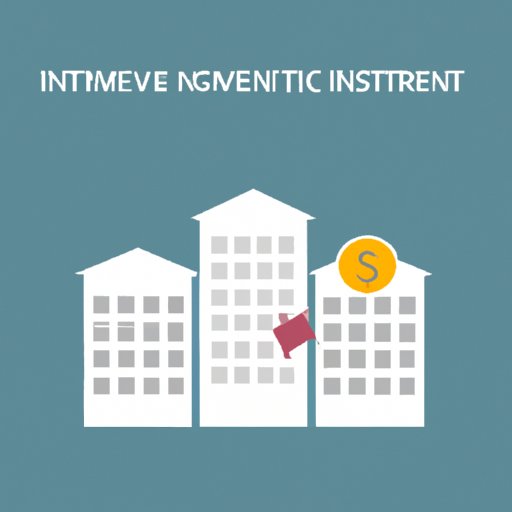Introduction
Investment property businesses have become increasingly popular as more people seek to diversify their portfolios and maximize their income. An investment property business involves buying, selling, renting, or managing real estate for profit. There are several benefits to investing in property, including appreciation of the asset, passive income, and tax advantages. However, there are also many financial and legal considerations that must be taken into account when starting an investment property business.

Outline the Steps to Starting an Investment Property Business
Before beginning an investment property business, it is important to understand the process and the steps involved. The following is an outline of the steps you should take when starting an investment property business:
1. Research the Market
The first step to starting an investment property business is to research the market. You will need to analyze current trends and determine if the market is favorable for investing in property. Additionally, you should research the local economy and housing market to get a better understanding of the risks and opportunities associated with investing in property.
2. Create a Business Plan
Once you have done your research, it is important to create a business plan. This plan should include a detailed description of your goals, strategies, and tactics. It should also include a budget and timeline for achieving your goals. Having a business plan in place will help you stay organized and on track as you begin your investment property business.
3. Obtain Financing
The next step is to obtain financing for your investment property business. Depending on the type of investment property you are looking to purchase, you may need to secure a loan from a bank or other lender. In some cases, investors may also be able to use their own funds or leverage existing assets to finance their investments.
4. Choose the Right Property
Once you have obtained the necessary financing, the next step is to find the right property. You should consider factors such as location, price point, and potential for growth when selecting a property. Additionally, you should always conduct due diligence before making any purchases.
5. Establish and Maintain Good Relationships
Finally, it is important to establish and maintain good relationships with tenants, lenders, and other stakeholders. These relationships can help you achieve success in your investment property business by providing valuable insight, advice, and resources.
Explain the Different Types of Real Estate Investing
Real estate investing can take many forms, depending on the individual investor’s goals and objectives. The following are some of the most common types of real estate investing:
1. Residential Real Estate
Residential real estate investing involves purchasing single-family homes, duplexes, condos, or other residential properties to rent out to tenants. This type of investment can provide steady income and potential appreciation of the asset over time.
2. Commercial Real Estate
Commercial real estate investing involves purchasing office buildings, retail stores, warehouses, and other commercial properties. This type of investment can provide a higher return on investment but is typically considered more risky than residential real estate investing.
3. Vacation Rentals
Vacation rentals involve purchasing properties in desirable vacation destinations and renting them out to travelers. This type of investment can provide a steady source of income, but it also requires more effort to manage and maintain the property.

Discuss the Financial Requirements and Risks Involved
When starting an investment property business, it is important to understand the financial requirements and risks involved. Here are some tips to help you navigate the financial aspects of investing in property:
1. Know Your Budget
It is important to know how much you can afford to spend on an investment property. You should factor in all costs associated with the purchase and maintenance of the property. Knowing your budget ahead of time will help you make informed decisions and avoid overextending yourself financially.
2. Understand the Risks
Investing in property carries certain risks, such as fluctuations in the market and unexpected repairs. It is important to understand these risks before making any investments. Additionally, you should consult with a financial advisor to ensure you are taking all the necessary precautions.
3. Consider Insurance
You should also consider purchasing insurance for your investment property. This will protect you in the event of any damage or loss caused by tenants or other unforeseen circumstances. Insurance can also provide peace of mind knowing your investment is protected.

Provide Tips on Choosing the Right Properties for Investment
When selecting properties to invest in, there are several factors to consider. Here are some tips to help you choose the right properties for your investment portfolio:
1. Location
Location is one of the most important factors to consider when choosing an investment property. You should look for properties in areas with strong economic fundamentals and good potential for appreciation. Additionally, you should research the local rental market to determine if there is sufficient demand for rental properties in the area.
2. Price Point
It is also important to consider the price point of the property. You should look for properties that are priced below market value and have the potential for appreciation. Additionally, it is important to factor in all associated costs when determining the total cost of the property.
3. Opportunity for Growth
Finally, you should look for properties that offer the potential for growth. This could include properties located in up-and-coming neighborhoods, properties with multiple units that can be rented out separately, or properties with features that can be upgraded to increase their value. By investing in properties with potential for growth, you can maximize your return on investment.
Conclusion
Starting an investment property business can be a rewarding endeavor, but it is important to understand the process and the financial requirements and risks involved. Doing thorough research and creating a business plan will help you stay organized and on track. Additionally, selecting the right properties and understanding the local market are essential for achieving success in your investment property business.
(Note: Is this article not meeting your expectations? Do you have knowledge or insights to share? Unlock new opportunities and expand your reach by joining our authors team. Click Registration to join us and share your expertise with our readers.)
